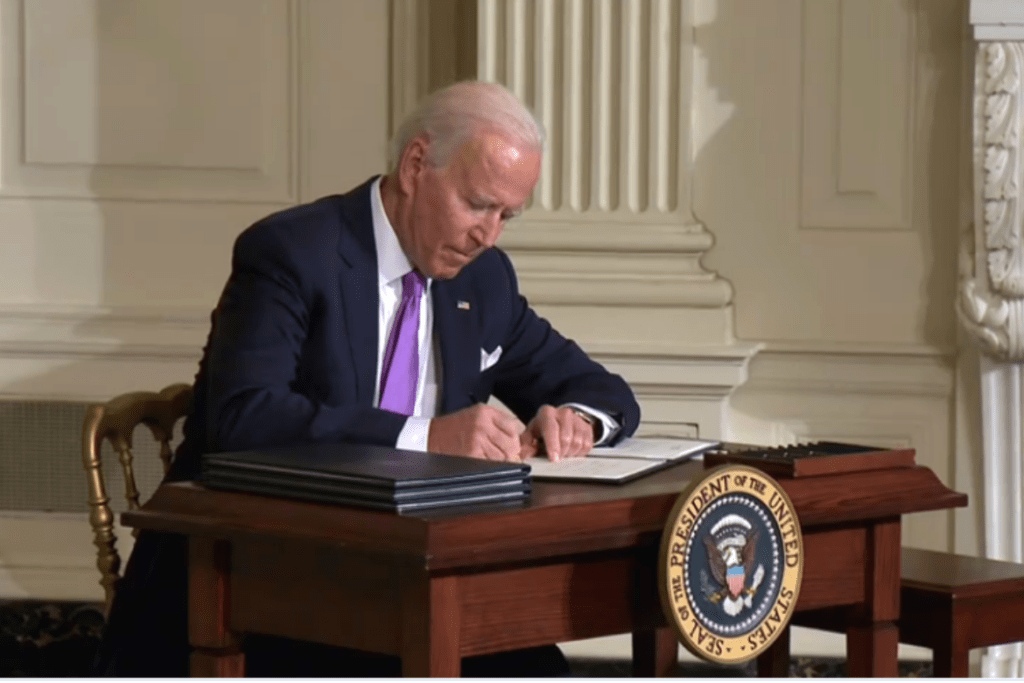Candidate Biden campaigned to bring unity to the country. But the horrific seizing of the Capitol on January 6, 2021, gave Democrats and the soon-to-be Biden administration the justification to ditch the calls for unity. And ditch them they have. The Biden administration is pursuing a radical progressive agenda by Executive fiat, stretching the limits of Executive authority more than the Constitution allows.
The immediate issuance of 17 Executive Orders (EOs) on the first day was surprising to those expecting some bipartisanship due to Biden’s comment that “you can’t legislate by executive action unless you’re a dictator.” When Biden issued more EOs every day, Fox News pounced, claiming he was acting as a dictator. The fact-checkers countered that the quote was taken out of context. In six days, 43 EOs and presidential memoranda requiring all new regulations implementing policies that are not contained in the laws passed by Congress were signed. Assuming the quote was taken out of context, it is not credible to believe that these can be implemented by a president without exceeding lawful presidential authority.
President Biden, however, confirmed his many EOs were policy changes when stating, “I’m not making new law, I’m eliminating bad policy.” But his policies will be formulated and implemented as new laws through regulations, so he is changing law without congressional approval.
The curious aspect of the EOs is that they were issued with Democrats having the votes to control both houses of Congress. Either Biden does not believe he has the votes to secure passage of his programs or he views Congress as his handmaiden subject to his every order?
The most troubling of all Biden’s orders is the Memorandum on “Modernizing Regulatory Review” which requires new regulations to achieve racial justice, social welfare, environmental stewardship, human dignity, equity, and the interests of future generations—in addition to statutory requirements. These new, more undefined goals, would require substantive provisions in regulations that are well beyond the scope of the laws passed by Congress. This policy directive could have a massive social and economic impact since agencies issue around 4,000 regulations a year, about 80,000 pages worth of new law.
Policy changes by EOs go far beyond the laws to be implemented
- Cancellation of permits for the Keystone XL pipeline and suspension of new federal oil and gas leases will directly put thousands of workers, with well-paying jobs, out of work. Thousands more who work in the service industries along the route will lose work. It will ensure the U.S. is no longer energy independent, reduce export supplies and dramatically increase the price of energy. It will also disrupt Canada’s oil production. Less U.S. oil and gas production will, make more Canadian oil available to China and ensure a market in the EU for Russian oil and gas.
- Biden re-joined the Paris Climate Agreement and ordered the reversal of most of Trump’s environmental orders and regulations. These EOs will increase the cost of fuel for cars, energy for homes, manufacturing, and most retail products. With China being exempt from compliance with the Paris Agreement, China becomes more competitive by having a less costly regulatory compliance. China will continue to grow as the world’s largest economy.
- Simultaneously stopping the construction of the southern border wall, while allowing undocumented, untested Covid-19 immigrants from Central America into the U.S., will likely increase the spread of the virus. Caravans are on route. Conversely, with an open southern border, Biden reimposes a travel ban on EU countries, our truest allies.
- The EO relating to nondiscrimination of the transgender population effectively ends girls’ sports. So much for Title IX protections.
- Biden ordered face masks be worn by all on federal property, but arbitrarily exempts himself. It’s Governor Newsom’s law of hypocrisy – laws only apply to us little people we call citizens.
- Biden provides billions to public schools to defray the cost of opening but does not require teachers to return to teaching.
- Workers can continue receiving supplemental unemployment compensation for as long as they “fear” returning to work.
Texas immediately took action to defend its citizens and industries. In a few days, it secured a nationwide injunction against the immigration EO. A few days later, it announced it was suing over the climate EO canceling the Keystone XL pipeline and suspending new oil and gas permits. The large number of EOs will be a constant source of litigation as to presidential authority. Also, each proposed regulation that attempts to incorporate one or more of the new policies set out in the Memorandum on “Modernizing Regulatory Review” will likely be litigated.
For decades, presidents have expanded their executive power through EOs and new regulations. Congress has assisted in this power grab by passing broad and vague laws that give presidents reasonable support for asserting such power. An imbalance has created a strong executive voice and an irrelevant Congress. The Biden presidency may inform us whether presidents need a supportive Congress to implement their agendas or whether Congress is an irrelevant handmaiden.
Part II will focus on how the vitriol in Congress unifies Democrats to implement a permanent one-party rule by packing the Supreme Court, voting for DC statehood and eliminating the Electoral College.
Image: White House Twitter

